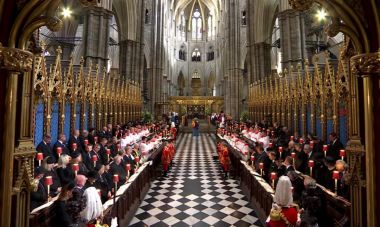7 sacred songs performed at Queen Elizabeth II's funeral

(CP) Queen Elizabeth II, the longest-serving monarch of the United Kingdom, was honored with a full state funeral Monday at Westminster Abbey followed by a procession to Windsor Castle for a committal service at St. George's Chapel where she was laid to rest in the royal vault.
A devout Christian and a monarch whose authority included serving as Supreme Governor of the Church of England, Elizabeth II's funeral included several sacred hymns and choral pieces. At St. George's Chapel, the service opened with the choir singing Psalm 121, "I will lift up mine eyes unto the hills," which was said to be among the late monarch's favorites.
"The musical portion of the Order of Service for the burial of the late queen is exactly what one would expect it to be," wrote classical music critic Ivan Hewett of The Telegraph.
"It is rooted in the traditions of past royal funerals, in a variety of musical styles from Jacobean formality to Edwardian sentiment, with just one very mild whiff of 'modern music.' There are also subtle nods toward the queen's own musical tastes and loyalties ..."
Here are seven pieces of sacred music performed during the funeral of Queen Elizabeth II. They include popular hymns and notable choral pieces that have lengthy histories:
'All my Hope on God is Founded'
A product of the Protestant Reformation, "All my Hope on God is Founded" was composed by the short-lived yet prolific hymn-writer Joachim Neander in 1680, originally with the German name "Meine Hoffnung stehet feste."
The hymn was translated into English in 1899 by Robert Bridge and eventually given its current melody by notable English composer Herbert Howells.
'Christ is made the sure foundation'
The hymn "Christ is made the sure foundation" derives its existence from the Medieval Era, composed by an unknown author in Latin during the seventh century and later translated by John Mason Neale in the 19th century.
"Neale's original translation has been altered significantly for today's hymnals, and the flowing plainsong melody has been replaced by the stately tune Westminster Abbey composed by the famous English composer Henry Purcell," explained C. Michael Hawn, professor at Southern Methodist University.
"Yet something of this song from deep in our Christian past remains and still informs our faith today if we will allow ourselves to sing with the saints."
'The Day Thou Gavest Lord is Ended'
Commonly used at evening services, "The Day Thou Gavest Lord is Ended" was written in the 19th century by John Ellerton, a minister of the Church of England.
"This inspiring and uplifting melody sets the lyrics in motion for an ever flowing waltz of affectionate love. These are no mere words of a self focused individual, but from the soul of a person devoted and affectionate to the One true God," wrote theologian Simon Peter Sutherland.
"They ascribe to God the honor and praise as the One who gave the sinner the gift of each day and night. The knowing that God hears the praises of His people. They give thanks to Him continuously for His provision and building of His Church."
'The Lord's my Shepherd, I'll not Want'
Based off Psalm 23, which is one of the most famous biblical passages in popular culture, "The Lord's my Shepherd, I'll not Want" was written in the 17th century by Francis Rous.
According to Andrew Remillard, the tune most associated with the hymn, known as Crimond, was added in the 1870s, or more than 200 years after the text was penned.
"It is named after the Crimond Church in the Aberdeenshire town of Crimond. It was composed by Jessie Irvine, who was the daughter of the pastor," Remillard explained.
"David Grant later re-harmonized it for her. Grant served on a committee which was charged with assembling a new hymnal of metrical psalms and hymns. It was published in 1872 and was very successful with sales exceeding 70,000 copies."
'The Russian Kontakion of the Departed'
Commonly performed during funerals as a way to remember one's own mortality, "The Russian Kontakion of the Departed" traces its origins back several centuries to the Orthodox Church.
The word "Kontakion" derives its origin from the Greek word for "pole," as in the pole that was used to roll up a scroll, according to The Sun.
The somber choral piece was used at the funeral of Prince Philip, the late husband of Queen Elizabeth II who died in April 2021 at the age of 99.
'Sheep May Safely Graze'
Composed by Johann Sebastian Bach in 1713 and also known as The Hunting Cantana, "Sheep May Safely Graze" is yet another song loosely based off of the popular Psalm 23 passage.
"Written for the thirty-first birthday of Duke Christian of Saxe-Weissenfels, the cantata was performed as a surprise at a banquet at the ducal hunting lodge, and it's full of flattery," noted the blog Art & Theology.
"The text of 'Sheep May Safely Graze,' written by Solomon Franck, praises Christian for his wise, protective leadership (in actuality, he was a lousy ruler)."
'Schmücke dich, O liebe Seele'
Written by Johann Sebastian Bach, "Schmücke dich, O liebe Seele" is a popular choral piece rendered as "Adorn yourself, O dear soul" or "Soul, adorn thyself with gladness" in English.
A choral prelude, it is traditionally performed during Holy Communion, with influence for the song reported to have come from the work of Bach's predecessor Johann Crueger.











